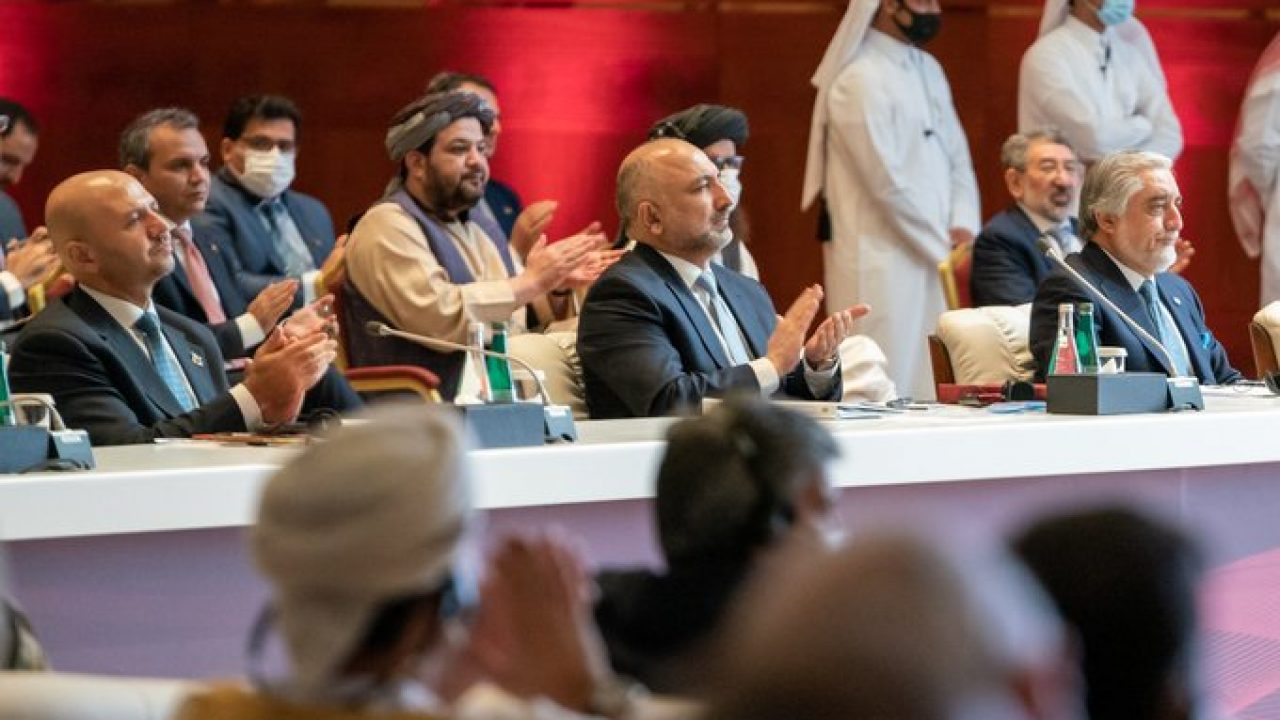This is one of a series of interviews by Bloomberg Opinion columnists on how to solve pressing policy challenges. This conversation has been edited and condensed.
James Gibney: Peace talks started in Doha, Qatar, on Sept. 12 between the Afghan government and the Taliban. More than 2,400 American troops have died in Afghanistan since 2001, more than 20,000 have been wounded, and the U.S. has spent close to $1 trillion fighting the Taliban and supporting the government. From 2013 to mid-2017, you were the deputy and then acting Special Representative for Afghanistan and Pakistan at the State Department, and your work at the RAND Corporation and now the International Crisis Group still focuses heavily on Afghanistan. What goals should the U.S. have for the successful conclusion of these talks?
Laurel Miller: At the top of the hierarchy of U.S. national interests are concerns about terrorism — Al Qaeda still has somewhat of a presence in the Afghanistan/Pakistan area, ISIS is there, and so are other terrorist groups that pose a regional threat. What you want to see emerge from the negotiations is a government that is a potential partner in dealing with U.S. terrorism concerns and has the capacity to do so. The U.S. also needs a result that doesn’t destabilize regional security dynamics, like intensifying competition between Pakistan and India over Afghanistan. And the U.S. wants any government that results from a peace process to protect as much as possible the rights of women and minorities, and the kinds of civil liberties and freedom that have, to some degree, taken hold in Afghanistan over the last 20 years. There’s also the question of whether any peace agreement upholds U.S. credibility. Will this be the kind of agreement that merely leads to an infamous “decent interval” like that which preceded the collapse of South Vietnam after the Paris peace talks? From a broader perspective than U.S. interests, the number one goal should be getting a result that dramatically brings down the violence so Afghans can get on with their lives.
JG: In 2017, after you left government, you told Politico that “The United States has never really put the kind of political muscle and diplomatic muscle behind the effort in a consistent way that would be necessary to launch peace talks.” So how did these talks get started? Did the Trump administration apply political and diplomatic muscle? Or did it just lower the bar?
LM: Both. The Trump administration decided in 2018 to prioritize getting out of Afghanistan, and that a peace process was the best way to do so. At the same time, it changed long-standing U.S. policy. In the past, the U.S. wanted to launch a peace process only with the Afghan government at the table from the get-go, and would not agree to a drawdown of U.S. troops before the Taliban met with the Afghan government. But the Trump administration agreed to a drawdown timetable in exchange for some counter-terrorism assurances and a commitment by the Taliban to enter into peace talks with the Afghan government. It was a concession to the Taliban. I happen to believe it was the only way to kick-start the talks. But as a result, the Taliban comes to these intra-Afghan talks in a strengthened position with enhanced legitimacy.
JG: Should the intensifying strategic competition between the U.S. and China change U.S. thinking about the importance of keeping troops in Afghanistan? What about, for example, the efforts of the U.S. to cultivate India as a strategic partner? Wouldn’t a U.S. pullback from Afghanistan undermine that effort?
LM: Yes, to some extent. But unless the United States is willing to have no relationship with Pakistan, then there are always going to be differences between the U.S. and India on policy related to the region. It will be important to manage the Indian dissatisfaction with an American pullback from Afghanistan, and it will be important to stress to India that the U.S. is not going to be drawn into zero-sum thinking about its relationships in the region.
JG: How constructive have Afghanistan’s other neighbors — powers such as Iran, Russia, China — been in regard to the peace talks?
LM: Even those countries that have strained relations with the U.S. have been essentially supportive of the U.S. peacemaking initiative and tolerant of the continued U.S. military presence. A chaotic Afghanistan is not in their interests. Iran is not going to say, “You go, America. What you’re doing is fantastic.” But I think there’s an appreciation that it’s better for them if it works than if it doesn’t.
JG: When you were with the RAND Corporation, you wrote a paper that laid out a draft peace agreement and the pitfalls and spoilers involved in any Afghan peace process. It’s still early days, but do you have a sense of whether your hopes or fears are closer to being realized?
LM: It’s too early to say. Neither side has lost or has absorbed the idea that they are losing on the battlefield. Both may still feel that they have alternatives to making compromises. A real sticking point is already emerging over the insistence of Afghanistan’s government on an early ceasefire. There’s just no-way, no-how that the Taliban are going to agree to an early ceasefire. The Taliban are fighting for power. Violence is their leverage. So I just don’t see substantial reductions in violence coming until the process is much further along. Longer term, the biggest sticking point is going to be the system of government — what kind of modifications will there be in particular to bring more Islamic governance elements into the system?
JG: To what extent is the U.S. election shaping the dynamics of the peace talks?
LM: Why would either side make any significant moves or compromises until they know how that’s going to turn out? They’ve all seen changes in the cast of U.S. characters before because this war has been going on so long. If Trump wins again, then things can just go on without any recalculations related to American politics. If Biden wins, then I think the whole process will be in the doldrums between the election and the inauguration.
JG: Given that, what should happen with the drawdown of U.S. military forces? What happens, for instance, if Trump loses and in the transition, continues to reduce the number, creating a strategic fait accompli for an incoming Biden administration?
LM: The U.S. has already said that troop levels will be drawn down to around 4,500 by the date of the election. That appears to have been long planned. If Biden wins, the real question is whether it’s plausible that the rest of U.S. troops will be pulled out between February and the end of April, which is what’s called for under the Doha agreement between the U.S. and Taliban. Every single deadline in that agreement has been violated so far. I don’t think we’re going to see 100% of American forces and contractors and everyone else pull out by the end of April. But that deadline does shorten the timetable for the U.S. to figure out what it’s doing. Is a Biden administration really going to pull out, or is it going to try to renegotiate or reinterpret the terms of the Doha deal?
JG: What are the biggest sources of leverage the U.S. has to shape an agreement that achieves the hierarchy of goals you set out?
LM: The U.S. military presence is leverage over the Afghan government, in the sense that it is still existentially dependent on U.S. security assistance in its counterinsurgency fight with the Taliban. It is less effective as leverage over the Taliban, because the Taliban knows that the U.S. wants to get out of Afghanistan. But the military presence also is leverage in a less mechanical sense because it keeps the U.S. relevant in Afghanistan and in the region. Even with the considerable erosion of U.S. influence, there’s still no other actor to which everyone else — the regional countries, NATO allies, the Afghans themselves — looks to, however grudgingly, to push things along in Afghanistan.
U.S. economic aid is direct leverage over the Afghan government and, in a more theoretical sense, over the Taliban. They’d like to be back in power, but preferably not in an impoverished, pariah state. They would like to have international legitimacy and their share of the gravy train that they didn’t get to directly dip into over the last 20 years. On the other hand, I don’t think they’re going to be willing to pay a super-high price in terms of compromising their principles in exchange for some aid dollars.
The third form of leverage is the U.S. ability, not fully tapped in my view, to bring together the countries of the region in some kind of collective, or at least simultaneous, exercise of their own leverage. If you can get everyone rowing in the same direction in applying pressure to the parties, that will be powerful and important, not only in getting a result, but in implementing any agreement.
JG: You put the fight against terrorism at the top of your hierarchy of interests that the U.S. wants any peace agreement to advance. But if there is a power-sharing agreement with the Taliban, they’re presumably not going to be keen about U.S. forces in the country. Can the U.S. effectively pursue its anti-terror goals if it no longer has that military presence?
LM: One of the debates that Washington has yet to have, on either the Republican or Democratic side, is whether the U.S. is really prepared to have zero troops in Afghanistan. People talk about a residual force, some continued longer term presence that’s focused on counter-terrorism. I don’t think that’s a sustainable proposition: a successful peace process isn’t likely to yield consent for the United States to keep troops in Afghanistan, because the Taliban won’t agree to it. So, it’s crucial that the U.S. think about alternative means of dealing with its counter-terrorism concerns that don’t involve bases within Afghanistan.
JG: That’s a bracing thought. How did your views about Afghanistan shift over the time that you were working on it? Put another way, what did you know when you left your post as special representative that you wish you’d known when you started?
LM: At the end, I was much more skeptical of Defense Department ambitions regarding the development of Afghan security forces and much more skeptical of their claims of potential progress in the war fighting. There have always been divergences between assessments of Afghanistan by the intelligence community and by the Pentagon. Intelligence analysis can only really project forward from past experience. The intelligence community can’t factor in hypothetical success, as the Pentagon would do in talking about the potential impact of planned policies. So it was easier to see intelligence analyses as being too pessimistic. And let’s face it, you’re rarely held accountable for being too negative. By the time I finished, though, I felt that the intelligence community basically got it right all along.
JG: You and I first met in the mid-1980s in Japan. Did you always envision that you’d be doing this kind of work?
LM: Well, Afghanistan wasn’t exactly on my radar at the time. And I don’t hold myself out as an expert on the country, per se. But I was always interested in international affairs, and foreign policy. And so I would say it was, in fact, my ambition, even back in our mutual youth, to be involved in that in some way. But “in some way” is always a winding path. It took me through the Balkans, the Bosnia peace process, Kosovo and the peace process in Macedonia.
JG: What advice would you give to someone who wants to start off on that path?
LM: Join the Foreign Service. That’s the best way to guarantee that you are dealing with interesting foreign policy issues throughout your career. It’s not to say that you’re always dealing with actual policy making, or that you always get to choose, as you know even better than I, what you’re working on.
JG: Yes, indeed. And what should these budding diplomats watch for in these peace talks? What would you say is the bottom line for whether they can be judged a success from the U.S. point of view?
LM: This might sound a little simplistic, but if these peace talks produce an agreement that these two Afghan sides in the conflict subscribe to, it will be de facto a success. I don’t believe that they are going to agree to something that would be anathema to U.S. interests. The Afghan government side is not going to throw women’s rights entirely under the bus, for instance. Will an agreement be exactly what I would write, what the American government would write, what Afghanistan’s neighbors would? That’s harder to say. But it’s pretty unimaginable that they would not produce a result that is just fine for the U.S. And getting a result that ends most of the violence creates a whole new canvas for the U.S. to decide what kind of relationship with Afghanistan that it wants to try to paint.













